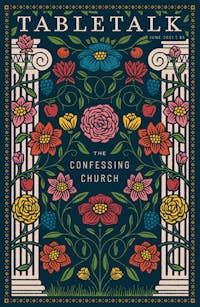
Request your free, three-month trial to Tabletalk magazine. You’ll receive the print issue monthly and gain immediate digital access to decades of archives. This trial is risk-free. No credit card required.
Try Tabletalk NowAlready receive Tabletalk magazine every month?
Verify your email address to gain unlimited access.
If we could sum up everything we want for our children, wouldn’t it be that they would find the Lord Jesus Christ to be their very life? If our answer is “Yes and amen!” then we must lead them to trust the Bible with their very lives. To know the Savior, we need the Scriptures. Yet therein lies the defining cultural crisis for the church in our day. While we encourage our children to remember their Savior’s Word in the days of their youth, we’re rearing them in a culture that has historically worked so hard to forget it—and that in our day has succeeded.
Contemporary Western culture is profoundly post-Christian; its radical anti-Christian stance shows up in its present posture toward the Bible. Centuries ago, Satan sank his fangs doubly deep into Western society by adding a new dimension to his ancient lie. In Eden, the serpent twisted what God said, suggesting dark motives behind it. In the modern West, Satan’s insidious influence led to the allegedly enlightened dogma that God cannot speak at all. Increasingly, conventional wisdom said that direct, verbal speech was beneath God’s dignity. Over time, this venomous idea has sunk more deeply, more definitively, into our culture’s assumptions. We’re now past concerns about whether the Bible is inaccurate. These days, we believe the Bible is impossible.
The infamous atheist Friedrich Nietzsche recognized what many Christians in his day missed: that the biblical God is mute in the West because He’s been “murdered” by our culture’s rejection of His involvement in the world. The dark prophet understood the horizon-scrubbing significance of God’s silence. So did the great Christian novelist Fyodor Dostoevsky, who said with grave warning what Nietzsche proclaimed as glad tidings: If God does not exist, then anything is permissible for man. So, like cosmic grave robbers, Western man has progressively seized God’s possessions and called them our own. Today, our deity is no longer a cursed Edenic aspiration; we consider it a blessed cultural achievement. Children in our era come of age in the wake of God’s death, and the dehumanizing consequences are hard to fully comprehend.
Imagine growing up sincerely believing that you are God, that you possess God’s privileges, prerogatives, and power. The best evidence that this satanic presumption has settled in is our assumption of the authority and ability to define ourselves at an essential level. Self-definition can only come from self-existence, a property belonging to God alone. Yet it’s commonplace to refer to ourselves in ways only applicable to God. Our culture’s oft-repeated mantra of personal identity—“It’s who I am”—might be innocuous in itself, but when we search for the source of its supposed truth, we spy its satanic subtlety. In Scripture, God says “I am” as a statement of His essential being and exclusive glory. We use our “I am” statements the same way. We’ve ascribed all authority in heaven and on earth to the self. And just like in the garden, our self-definition is leading to self-destruction.
The unprecedented struggles with anxiety and suicide that younger people endure today are thoroughly documented, but they cannot be thoroughly diagnosed in a culture that refuses to consider the consequences of its presupposed ideas. Placing on children the burden of godhood creates unbearable pressure. They feel it acutely as unbending reality refuses to yield to their personal truth. We often admonish them to “get out of your head,” but we’ve made that life-giving exodus literally unthinkable. Chaining them to unrelenting self-reference in understanding themselves and all of reality, we’ve bound them as solitary slaves to the irrefutable dictates of a self-defined life.
The common expression “my truth,” meant to empower individuality, actually breeds isolation. Standing immovably in personal truth prevents fellowship based on mutual submission to the truth. This cultural scenario is so perfectly satanic. Our enemy will call us a god, gut us, and leave us to die alone.
Children in our day face deep insecurity about personal identity. When they face doubts, whose words will they trust to tell them who they really are and what they’re really worth? So many children define themselves by the cruel things others say about them, or by their own words in times of quiet desperation when self-understanding goes dark. Despite what Satan has always told us, Scripture’s call to lean not on our own understanding is liberating. And especially in our day, it’s lifesaving.
The very first page of Scripture defines our children as image bearers of the true and living God. Just three chapters in, they’re told in mystery-cloaked language unveiled in Christ that they are worth the life of the Father’s beloved Son to seek and to save. That Son, the true God-man, calls us not to self-definition but to self-denial. And in Him, self-denial yields self-discovery.
Cleansed from sin and re-created in Christ, we live our truest, fullest life, led by the written Word of the self-existent God who knows us, and all things, definitively. Jesus Himself looked to the Scriptures to lead Him through life in this world. Not even God incarnate wanted to self-define. And that’s the best reason there is, and the truest encouragement we can give our children, to trust the Scriptures: Jesus did the same.
A life lived believing in Jesus and believing what Jesus believes—what more could we want for our children, and what better could we imagine? The Scriptures light the path to such a life.
